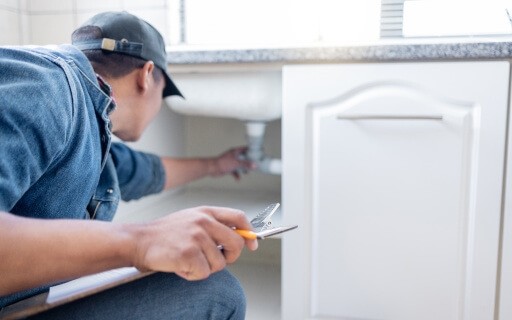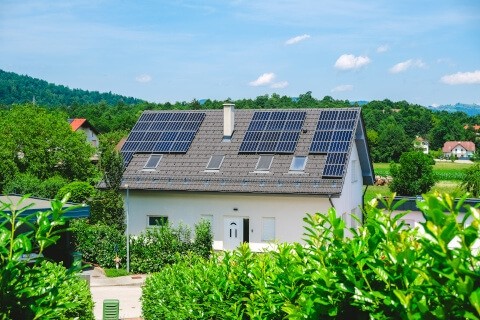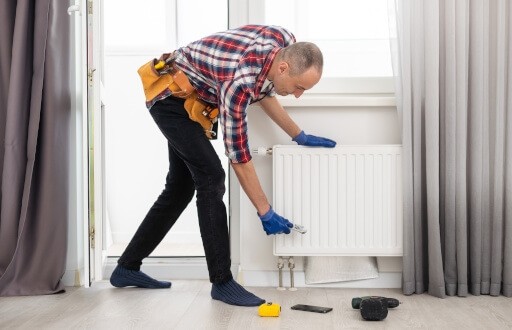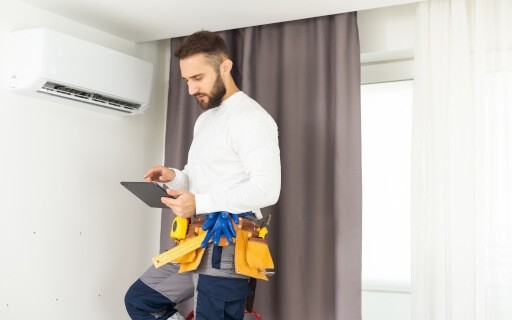Properly maintaining your rental is the key to a successful business relationship and a happy tenant, but there’s more to maintenance than most landlords realize. You should be maintaining the major systems in your house like the HVAC, electrical, plumbing, gutters, and more, but you should also be maintaining your home appliances. Inspecting and testing your major appliances is integral for ensuring they are safe for your tenant to use and that they are running at peak performance.
Most major appliances can be properly assessed by almost anyone through a simple visual inspection. Once you know what to look for, routinely testing and inspecting your appliances between tenants should help them last longer and lead to a better experience for your renter.
The Dryer
Your dryer is the appliance you should test and inspect most frequently. A poorly functioning dryer and vent system can overheat and start a fire. According to FEMA, dryers cause 2,900 fires in the United States annually. To test the dryer after making sure the vent and lint trap are clean, dry a load of clothing you’ve just run through the washing machine and conduct these simple tests:
- Turn the dial to manual and make sure the dryer starts. Check for excessive vibrations or squeaks, which could mean the drum belt is loose.
- Set the timer to 60 minutes or the drying cycle to “Normal” and time how long it takes for the dryer to shut off. It will be 60 minutes if the manual timer is working. The timing is variable for an electronic dryer, but it should be close to 60 minutes.
- Take o the clothes out and feel how dry they are. If they still feel wet, the vent line could need a deeper cleaning. If you’re sure the vent is clean, it’s time to call a pro to check the burner or heating element on the dryer.
The Washing Machine
Like dryers, washing machines often malfunction because something in the drain hose is blocked. In this case, the outlet is inside the machine, and you may have to have it professionally removed. But first, you need to know it’s there.
- Do a load of wash and make sure the machine fills and drains properly.
- Check for any vibrations or strange sounds that could indicate a loose belt or a problem with the motor.
- Doing a load of wash also gives you an opportunity to test the controls. If you hear any sounds, the machine vibrates excessively, or the controls don’t work, call a service pro.
The Refrigerator, Freezer, and Ice Maker
Refrigerators also have moving parts, but the parts that fail most commonly are the compressor and the condenser coils. The telltale signs of a refrigerator that needs some help is an interior temperature above 40 degrees Fahrenheat, or any excessive noise. Since a refrigerator is always on, you will most likely be able to hear when something has gone wrong. The sounds are a warning to call a repair pro or get a new fridge. The gaskets, fan, and refrigeration system itself are also important.
- Open and close the doors to check the gasket seal. You should feel a slight pull on the door when it’s almost closed. Replace gaskets that are torn.
- Put a thermometer inside the fridge and turn the control to mid-range. Come back in 12 hours and check the temperature. It should be 40 degrees Fahrenheit. If it isn’t, turn the control to cold and check again in another 12 hours. Suspect a problem with the refrigerant if the temperature doesn’t reach 40 F.
- Look for water on the ground or in the refrigerator compartment. It can indicate problems with the refrigerant or the controls.
- Check the condenser coils for excess dust. Dirty coils won’t remove excess heat efficiently and can cause your fridge and ice maker to run hot.
The Water Heater
Landlords are required to provide heat and hot water for their tenants, so make sure the hot water heater in question – whether it’s a traditional heater or tankless – is healthy and working.
- Turn on the hot water at every faucet and check the temperature.
- Take a careful look at the color of the water. Cooler-than-expected water or a yellow or brownish tinge point to sediment, scaling, and/or rust in the water heater.
- Get it flushed before tenants move in to avoid water quality problems and premature water heater failure.
- Some tankless water heaters need yearly services to stay working properly, so if you’re unsure about the system, call a professional.
The Kitchen Stove and Oven
The kitchen stove and oven are probably the easiest appliances to test.
- Turn on each burner or heating element in turn and make sure it provides maximum flame or glow when the control is turned up all the way.
- Set the oven to cooking temperature – about 400 degrees – and place an oven thermometer inside. Wait for it to reach the target temperature.
- When dealing with electric or gas stoves and ovens, if anything seems out of the ordinary, call a professional.
The HVAC
To keep your rental habitable, you must provide heat and hot water. In some jurisdictions, you may also be required to provide air conditioning. HVAC maintenance is crucial to ensuring the safety and comfort of your tenant.
- To test the furnace or heating system, first replace all filters as necessary. Turn the system on and observe the thermostat. The home should heat up to the desired temperature in a reasonable amount of time. In extremely cold conditions, many jurisdictions require a home to maintain at least 68 degrees.
- If the desired temperature isn’t met, call a professional.
- To test your air conditioning system, replace all necessary filters. Remove the cover over one of the supply vents (where the air comes out). Place a thermometer inside and let the system run for at least 10 minutes. Record the temperature reading.
- Repeat this step with the return vent (where the air is pulled into the AC system). After you’ve recorded both temperature readings, simply calculate the difference between the two numbers by subtracting.
- As a fast and loose rule, you should see a difference of at least 20 degrees Fahrenheit between the two readings. If not, it’s time to call in the pros.
Additional Tips for Inspecting Appliances
When it comes to your home appliances, functionality and safety are your main concern. After you’ve tested each furnished appliance for basic functionality and performance, there are some other factors that may be easily skipped over but are equally important.
Looking for gas leaks
As you test appliances, be sure to listen for leaks coming from those that use gas. It’s a good idea to do a bubble test on each gas connection.
- Make a 50-50 solution of dish soap and water and spray some on each connection.
- If you see bubbles on any connection, tighten the connection.
- If you can’t stop the bubbles, get a licensed gas technician to service the connection.
Check the lights, plugs, and smoke detectors
An outlet tester will come in handy. Plug it into each outlet to check for power.
- Test GFCI outlets by pressing the bottom button on each one and verifying that the power goes off, and then press the reset button on the top to make sure the tester lights up again.
- Turn on each of the lights to check for burnt-out bulbs.
- Press the test button on each of the smoke detectors to make sure the alarm sounds.
The Importance of Routine Inspections
Routine maintenance and property inspections are key to maintaining a habitable rental for your tenant but can also help prevent small problems from becoming bigger issues. Routine home appliance inspections may uncover some problems that only the pros can fix, so make sure you’ve built in enough time during your pre-move-in and post-move-out inspections to get more serious issues fixed without extending your rental vacancies. Don’t be afraid to conduct inspections during tenancy either. These inspections can help uncover issues that tenants may not have noticed or were too worried to report. Just remember to give your tenant proper notice before inspecting the property. Encourage your tenant to report issues they notice during their lease by providing a simple way for them to submit maintenance requests. With our online maintenance platform, tenants can easily submit requests, and you can update them as the repair progresses. Let tenants know that they will not be penalized for appliance malfunctions outside of their control. The sooner they report, the sooner you can get it fixed.











